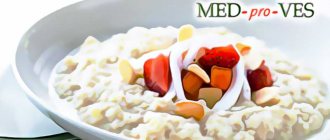Losing weight, losing kilograms without a trace, is possible only with the correct organization of your diet. The balance of calories and nutrients gives you energy and a feeling of fullness throughout the day, helping you not to go beyond the energy value of your diet. You can and should lose weight without exhausting and depleting diets, eating nutritiously and tasty food.
Eating at the beginning of the day “starts” metabolism and activates the body for the whole day. A lot of digestive enzymes are produced only between 7 and 9 a.m., so you can’t neglect a full breakfast—the enzymes will simply “burn out.” Professional nutritionists, nutritionists and fitness instructors recommend including 25% of the energy value of all food for the day in your morning meal. What products should it be expressed in, and why is it so important to teach yourself to have breakfast?
Losing weight, losing kilograms without a trace, is possible only with the correct organization of your diet. The balance of calories and nutrients gives you energy and a feeling of fullness throughout the day, helping you not to go beyond the energy value of your diet. You can and should lose weight without exhausting and depleting diets, eating nutritiously and tasty food.
Eating at the beginning of the day “starts” metabolism and activates the body for the whole day. A lot of digestive enzymes are produced only between 7 and 9 a.m., so you can’t neglect a full breakfast—the enzymes will simply “burn out.” Professional nutritionists, nutritionists and fitness instructors recommend including 25% of the energy value of all food for the day in your morning meal. What products should it be expressed in, and why is it so important to teach yourself to have breakfast?
Why is breakfast necessary?
You need to have breakfast for any diet, and even more so when losing weight. The first meal will provide enough energy to feel full until a full lunch and not be tempted by a harmful snack with “empty” calories. Even if there is no feeling of hunger in the morning, the body needs food to replenish the calories spent in the evening. The energy received at breakfast supports the immune system, the functioning of internal organs, speeds up metabolic processes and reduces appetite, helping to regulate the amount of food at lunch and dinner.
Eating early (before 9 am) improves memory, cognitive abilities and concentration - what you need for work. Also a properly organized breakfast:
- eliminates apathy, irritability, improves mood by replenishing energy reserves;
- activates digestion, nourishing the brain and muscles;
- increases productivity and clarity of thoughts throughout the day. Breakfast prevents your metabolism from slowing down and the feeling of hunger from distracting you from your work;
- reduces the risk of disease. Doctors confidently talk about the benefits of breakfast for leveling cholesterol levels, reducing the risk of heart attacks, vascular problems, and seasonal colds.
If you skip breakfast, the break in the flow of food into the stomach will be from 12 hours. This is a direct signal to the body to switch to energy saving mode. “Primitive” parts of the brain, which are responsible for survival in extreme conditions, will slow down metabolism. All food received during the day, even if its calorie content is limited, will go into fat reserves and will not be used up. This is the most common reason for weight gain and plateaus during weight loss.
Without breakfast, hunger will come earlier and be stronger, and due to uneven energy supply, metabolic processes will be disrupted. Without morning energy, the body will not be able to work normally, productivity will decrease and mood will worsen. After overeating at lunch due to hunger, a person will be lethargic and apathetic until the evening.
New in blogs
What's good about Russia? This question has already gone through a full cycle of intonations of its sound. Mocking in the 80s, filled with despair, rhetorical, cynical, turning into nihilism at the end of the 2000s. The time has come to translate the question into a practical plane - what is actually better with us? Not the weather/nature, but what is made with hands and invented by heads. Maybe it is the analysis and development of the best that will give an understanding of “how can we develop Russia?” The list of what's better in Russia than in Europe, compiled through a Facebook survey, turned out to be meager. But we scraped together 10 points with the whole world. 1. Moscow metro. St. Petersburg is already an acquired taste. The metro has expensive classical architecture, is very clean and has the simplest possible payment system. Easy to use and pleasant to be in. If only it weren't overcrowded during peak hours, we can give it an "excellent" rating. 2. Public WiFi. In the Moscow metro and surface public transport. With easy login, stable connection and decent speed. This is a great thing for the information age. 3. Cellular connection and 4G access speed. As well as a choice of unlimited tariffs. Here Russia puts Europe on both shoulder blades. 4. Free gloss. In the sense of magazines about a beautiful (usually) life. Firstly, it is available in large quantities, and secondly, it is of decent quality for such a product. Reading while waiting in line at the beauty salon will do. But the paid press in Russia, alas, is much worse. Well, let's not talk about the bad here. 5. Width of road lanes on highways. Perhaps it’s a matter of habit, but the roads of Europe are already very narrow. 6. Interior of restaurants. It is the interior, the kitchen itself that is often mediocre. In terms of beautiful, well-thought-out interiors of establishments and shopping centers, Russia is clearly ahead. I can’t speak for the atmosphere, but the average metropolitan restaurant looks nicer to the eye, fresher and more premium. In general, the desire for premium and status is one of the features of Russian entrepreneurship. It can be safely written down as a national peculiarity. 7. Opening hours of stores and service companies. This is our true achievement. For the mere absence of the “working hours” problem, a lot can be forgiven for the Russian service. No siestas, lunches or flexible schedules. Minimum, and more often no days off at all. It is very convenient and, in my opinion, modern. 8. Commercial dentistry. Compared to Europe, this type of medicine is quite on par with us, and most importantly, it is significantly cheaper. Equipment and technology change quickly. Most clinics try to be at the forefront of progress. We all understand that to be faithful, “you need to know the places,” but this amounts to only a minor quibble. 9. Retail banking service. According to the general opinion, domestic banks are much better than European banks in terms of service and technology. We have massive electronic queues at branches, payments through applications, the most advanced ATMs, convenient work hours, and there are plenty of branches themselves. 10. Classical ballet. The only point that I will leave without extended comments. The conclusion to the list was not planned, but it asked for it. In the traditional manufacturing sector (products, goods), we have not created anything outstanding. For any Russian product, there is more than one European analogue that is superior in all respects. Pavlovopaspdk shawls are inferior to those from Florence; the once “cult” Russian chocolate turned out to be not so chocolate at all. Russian crafts, that de Khokhloma, are an extraordinary, but absolutely ordinary phenomenon for Europe, moreover, stuck in the century in which it appeared. It’s scary to say, but the Finns and Swedes also cast doubt on the special quality of Russian vodka. It turns out that the era of creating authentic national products and forming industries has passed Russia by, barely touching it at all. In the sphere of, so to speak, “social technologies,” there is generally a gaping void. Poor service and local tourism, a meager number of cultural events of a good level. Overcoming the gap between Russia and the countries of at least Eastern Europe will be the longest and most painful here. The main thing is that training and building social skills is a complex, long process and requires serious efforts from the state. But with technological copying of varying complexity (space in the past and WiFi today), things are better in Russia. For reasons of status (metro) or in pursuit of the average ARPI (4g), the Russians may create a copy that is better than the original. There really is a “but” here - cost. An excellent copy often costs much, much more than the original. I doubt that society will pay such a price in the future. Although, who will understand us. The fall of communism unleashed entrepreneurial initiative in Russia. The owners sincerely strive to make something “the very best.” But these impulses are still limited to small and personally managed businesses. A small private restaurant is good, but it rarely passes the scale test. The most active entrepreneur lacks support at the level of hired management and ordinary employees. Almost more than there is a lack of clear rules at the state level. However, the list of obvious advantages largely consists of recent achievements. And this inspires some cautious optimism.
What should be the right breakfast?
The benefits of breakfast appear only if it is organized correctly. By losing weight, we reduce the energy value of food to 1200-1600 kcal per day. A morning meal accounts for up to 400 kcal, but what are they expressed in? If you get calories from sweet coffee with cream or a few chocolates, you cannot expect to be full until lunch and feel good.
A proper breakfast requires a balance of BJU (classic - a third of proteins, two-thirds of carbohydrates and one-fifth of fats) and nutritional value, the volume of food. In order not to cause drowsiness, it should be low-fat, light, and not cause bloating—you should avoid cabbage and similar products. The optimal volume and calorie content of food should be sufficient to leave a slight feeling of hunger.
A few more recommendations for organizing breakfast:
- Before meals, a glass of water at room temperature, half an hour before breakfast, is useful;
- the best time to eat is from 7 to 9 am, no later than 30-40 minutes after waking up;
- Breakfast at the same time every morning is the optimal start to the day;
- if there is no appetite in the morning, it is increased gradually, stimulated with the help of beautiful dishes, morning exercises, favorite foods (healthy), increasing calorie content gradually;
- you need to eat slowly, without being distracted by gadgets, without swallowing hot food, so as not to burn your mouth, larynx and stomach lining;
- frying and grilling are not the best ways to prepare breakfast;
- drinks should also be healthy. Green tea, coffee or kefir (after meals), and thin smoothies are suitable.
How to make a list?
I decided I needed to make a list and finally bring a touch of clarity and consistency into my life. Just... How to do this? How can you be accurate, so that at one time you can determine all the products that you will need for a week, what to do with perishable products? There are so many questions, it’s absolutely unclear where to start, maybe it doesn’t make any sense at all?
Calm down! There is no need to panic, we will be happy to help you understand this important issue, we will explain how and what needs to be done, in what order, and together we will make your life better.
First of all, you need to determine personal factors, because every family eats differently. For example, if you work a lot and when you come home you have neither the time, nor the desire, nor the strength to cook some broth or any other dish that takes time, you need to purchase as many products as possible from which you can prepare homemade semi-finished products. Or purchase as many products as possible that do not require long cooking.
For example, you can buy a lot of minced meat and set aside a free day to prepare meatballs, cutlets, stuffed peppers or zucchini, and cabbage rolls. In one day, you can prepare at least 5-6 different options for dinner from one minced meat, and then in the evening or in the morning it will be enough to just fry the ready-made semi-finished product, and at this time you can cook some cereal or pasta, plan a salad or stew vegetables .
There is another situation when a family tries to save more and feed themselves and their children a varied diet, sparing no time on preparation. In this case, you can buy whole chickens and use the fillet parts for hearty meat dishes. White chicken meat, by the way, is much more nutritious and cooks faster. But the remaining bones and small parts can be put into a rich, aromatic broth and cooked from it into tasty and healthy soups for lunch.
So, in order to make a grocery list for the week, the easiest way is to use this tool - write on a piece of paper the approximate menu for the week that you would like to see, this will make it easiest to purchase ingredients for the dishes you are familiar with.
Write down your preferred options for breakfast, lunch and dinner. And based on this sketch, you will see what products you need to prepare these dishes and in what quantities. A start has been made, you have a “skeleton” or outline of a list, which now needs to be supplemented with smaller necessary products that usually escape attention.
For example, tea, coffee or cocoa - depending on what drinks your family prefers. Then oils - vegetable or butter, olive. Sauces - mayonnaise or ketchup, sour cream sauces, condensed milk and jam - such products tend to run out unnoticed by you and not be at hand at the most necessary moment. In no case do not forget about salt, sugar and various spices - in families, a week is exactly the period for which they run out.
Then, additional products - cookies, ice cream, sweets and chocolate. It’s better to buy all this at once in order to control the amount of harmful but pleasant “bonuses” in your diet. However, we should not neglect them; we will decide to heroically exclude them from our diet completely - most often this ends in late walks to the nearest supermarket and unnecessary waste of money.
Special attention should be paid to perishable products that cannot be frozen. The list of such products includes bread and pastries, milk and dairy products, meat - if you are against freezing. Everyone has such products in their diet and require one or two extra trips to the supermarket, but there’s nothing wrong with that if you plan this trip in advance.
Just make a list in advance, indicate in what quantity and when these products need to be purchased, make footnotes. Then the products will already be pre-registered in your budget and you will spend the money allocated for them in a certain time allocated for them. You will see how simple it is when you go to the store according to plan and exclusively according to the list. Try it!
What's good for breakfast?
Breakfast should contain complex carbohydrates, fiber and proteins. They give energy and a feeling of fullness without heaviness in the stomach. The best food in the morning is porridge. Oatmeal, millet, buckwheat, corn and other cereals are sources of “slow” carbohydrates, which are so important for effective weight loss. They are easy to prepare so that the dish is tasty and beautiful.
There are a lot of cereals, so you alternate them, getting all the important nutrients. Oatmeal is a porridge without contraindications, which is completely and easily digested and stimulates digestion. Millet cereal is rich in amino acids, helps get rid of fat deposits, and goes well with milk, pumpkin, and nuts. Buckwheat is a “fountain” of microelements, including rare ones. Unrefined brown rice is low in calories and cleanses the body, and pearl barley, rich in phosphorus, helps digestion and stimulates the functioning of the heart and blood vessels (to speed up the preparation of porridge, you can soak the cereal in advance).
Whole grain and bran bread will also fill your body with carbohydrates. You should get protein at breakfast from eggs, lean fish and meat - for example, boiled chicken breast. The body will receive calcium from cheese and dairy products, and vitamins and a “charge of vigor” from fresh vegetables and fruits. Nuts (little by little, they are very high in calories), olive oil, honey will bring benefits, if you are not allergic to it.
List of healthy food products for a week for a family of 4 people
We have compiled for you a list of products that are mainly necessary for a family of 4 people for a week, but in our other article you can find out how to create an economical menu from the right products for a week for a family for only 2,400 rubles
Vegetables and fruits:
• a large head of cabbage; • bell pepper – 500-600 grams; • cauliflower – 1\2 medium head; • small zucchini or zucchini – 3 pieces; • garlic – 2 small heads; • onions – 5-6 medium bulbs; • broccoli – 300-500 grams; • green beans - 400 grams; • carrots – 700 grams or 6 large pieces; • potatoes – 2 kilograms; • eggplant – 2-3 pieces; • large tomatoes – 10 pieces; • cucumbers – 8 pieces; • a large bunch of greenery; • oranges – 4 pieces; • apples – 12 pieces; • bananas – 8 pieces; • grapes – 500 grams.
Nuts, dried fruits:
• raisins – 150 grams; • prunes – 150 grams; • dried apricots – 150 grams; • various nuts – 500 grams.
Cereals:
• oat flakes – 500 grams; • corn grits – 300 grams; • buckwheat – 500 grams; • brown rice – 500 grams; • pasta or spaghetti – 500 grams.
Dairy products:
• milk – 3.5-4 liters; • cottage cheese – 1-1.5 kilograms; • cheese – 250 grams; • sour cream – 1 glass, 350 grams; • butter – 300 grams; • white yoghurt, without additives – 2 liters.
Meat, fish, eggs:
• 1 whole broiler chicken; • beef fillet – 1 kilogram; • lean pork – 800 grams; • red fish – 1 kilogram; • white fish – 1 kilogram; • eggs – 3 dozen.
Additives:
• mayonnaise – 250 grams; • coffee – 150 grams; • tea – 30 bags; • tomato paste – 1 small jar; • olives – 1 medium jar; • sweet corn – 1 medium jar; • green peas – 1 medium jar; • vegetable oil – 250 milliliters; • jam or marmalade – 1 small jar; • condensed milk – 200 grams; • vanillin – 3 sachets; • black pepper – 25 grams; • salt – 200 grams; • sugar – 250 grams.
Foods not recommended for breakfast
In the morning, the body will be harmed by “fast” carbohydrates in foods that are immediately digested, increase sugar levels and cause hunger after a couple of hours. These include salty crackers and chips, sweets and sausages. Nutritionists call juice from packages, white bread, “store-bought” muesli and cereals dubious for the morning, even though they are tasty.
It’s worth giving up healthy bananas and citrus fruits in the morning. The former contain excess sugar and magnesium (it is harmful in the morning), the latter, eaten on an empty stomach, can provoke gastritis and ulcers. Undoubtedly healthy cottage cheese in most diets is left for the second half of the day (the exception is a diet rich in protein). “Empty” porridge with water is also not suitable, their calorie content is insufficient. To prevent the feeling of hunger from coming after two hours, they add honey, nuts, berries, and a little jam.
To lose weight, exclude from breakfast:
- smoked meats, sausages, fatty meats;
- industrial yoghurts with excess sugar and dyes;
- spices, fatty sauces, mayonnaise;
- canned food and pickles;
- pasta, pies and other baked goods, sweet pastries;
- soda, energy drinks, alcohol;
- fast food and sweet coffee drinks with syrups, toppings, cream.
What are healthy breakfasts?
Healthy and tasty meals are easy to find for any calorie-restricted diet. According to the balance of nutrients and the type of products, they are protein, carbohydrate, combined and special (for vegetarians, children, people with impaired metabolism).
Protein breakfasts
Protein breakfasts are recommended for people who work a lot physically, “build” muscles, and want to stay active throughout the day. On a diet with a predominance of proteins, men who require more calories than girls also lose weight without difficulty. A breakfast classic is eggs, boiled whole or in the form of scrambled eggs/omelet with herbs and vegetables. A slice of whole grain bread and a vegetable salad will provide the required portion of carbohydrates and vitamins. A sandwich with omelet and herbs, or a cottage cheese casserole will diversify your diet.
Carbohydrate breakfasts
Carbohydrates are chosen “slow”, complex. For fruitful mental activity, porridge with water with the addition of healthy fillings is suitable - dried fruits, cinnamon, nuts, cranberries, currants, baked apples, and so on. Whole grain or buckwheat pancakes with berries, a sandwich or pita bread with healthy fillings add variety to your diet.
Protein-carbohydrate breakfasts
Protein-carbohydrate meals according to PP contain iron, phosphorus, folic acid (especially necessary for women), selenium and other micro- and macroelements. For a breakfast with a reduced fat content, cottage cheese, cereals, eggs, bran and whole grain bread, vegetables and fruits that do not irritate the gastric mucosa are combined in different proportions and types.
Low-calorie breakfasts
The energy value of breakfasts is reduced with the help of dishes that contain fewer calories, but are fully satiating. This:
- porridge with water, especially oatmeal;
- lean fish and meat - cod, pike perch, chicken, turkey;
- eggs - egg white omelet, poached, scrambled eggs with herbs;
- cottage cheese with fruits and berries;
- salad with protein products and vegetables;
- vegetable pancakes with a minimum of flour;
- fruit salad with toast;
- tofu, carrot cutlets, puddings and so on.
Important to remember:
When losing weight, it is very important to balance the KBJU of the entire daily diet, and not just breakfast. Proper nutrition in the morning is ineffective without monitoring nutrients during lunch and dinner. Therefore, low-calorie breakfasts are necessarily complemented by thoughtful dishes for other meals. If you don’t have the time and skills to create a menu for weight loss, or don’t want to cook, the Light diet developed by BeFit specialists will help you for intensive and harmless weight loss.
Why do you need a list, how does it help make life easier?
Although, to be completely honest, all this has long been clear. We live in a world where there is no need to reinvent wheels, because everything that a person may need and will greatly help has already been invented and even brought to him.
Another thing is that not everyone is ready to accept this. When you are running, exhausted after work, with a bunch of different thoughts in your head, a desire to eat, sleep and quickly forget - is it possible to adequately perceive the need to somehow force yourself to sit down at the table and write something down, act according to some list, obey piece of paper. Yes, this sounds like real stupidity!
However, in the end it turns out to be stupid to refuse such help. Making a list doesn't take much time, especially if you do it regularly. But it will save you from an extra trip to the supermarket on a cold evening, from buying an extra chocolate bar or can of Coca-Cola.
A separate day is allocated for purchasing, on which you deliberately, in the mood, go to the store and purchase all the necessary products. Then you just need to open the refrigerator or cupboard and prepare a healthy lunch, dinner or breakfast. You will be very surprised at how pleasant it actually is to discover that you have all the ingredients for your favorite scrambled eggs or pie at home!
The benefits of using lists could be listed for quite a long time.
A huge saving of time and nerves by eliminating unnecessary running around.
Unexpected money savings - By doing your weekly grocery shopping and avoiding having to run to the supermarket almost every day, you'll be surprised at how much free money you have left over for a coffee with friends because you're only spending as much as you need.
And another very important plus is improved health. In addition to avoiding the daily stress of not having the right foods in the refrigerator, you can influence your diet in a very conscious way. Want to eat more vegetables? Add as many mixed vegetables and just fresh vegetables to the list as possible. By purchasing foods that you find healthy, you will be able to cook much healthier meals at home, which will give you the food you need and your diet will greatly improve. After all, why eat extra chocolate when you can quickly whip up a tasty and healthy vegetable or fruit salad with yogurt.
Several delicious recipes for breakfast or what to eat to lose weight
Easy, time-consuming breakfast recipes are varied. It’s easy to alternate them from day to day, and you won’t get bored with the food. Topping the list of breakfasts for weight loss is porridge. Oatmeal with kefir can be prepared in the evening - a glass of cereal/flakes is filled with 500 ml of a low-fat drink, and in the morning fillers are added to the finished dish to taste. Simply cook buckwheat - add two parts of water or milk to one part of the cereal, bring the mixture to a boil and simmer over low heat under a lid until cooked (the liquid has evaporated). Delicious millet porridge with pumpkin is cooked by mixing half a kilo of chopped vegetable with 3 glasses of milk, and after 15 minutes a glass of millet is added. The cereal is cooked until thick and, after being ready, infused under the lid for half an hour.
Recipes for other healthy and quick breakfasts:
- scrambled eggs or scrambled eggs (a quarter cup of milk per egg): these are complemented with cherry tomatoes, chopped green onions, boiled chicken breast, zucchini, bell peppers, spinach or tofu. It is advisable to stew the vegetables so that there is no excess liquid in the dish;
- fruit salad with nuts from apples, pears, peaches, apricots, pomegranate, pineapple (if desired, dressed with natural yogurt);
- smoothies made from strawberries, apples, kefir up to 2.5% with the addition of oatmeal, flax seeds or chia;
- a whole grain sandwich or lavash roll with hard cheese, vegetables, green salad, chicken or turkey, natural yogurt, egg and cucumber, vegetable omelet, cottage cheese with avocado, and so on.
A delicious, energy-rich breakfast without skipping is the path to weight loss and a beautiful, healthy body. With it you will feel great and your mood will be high.
Healthy food delivery Moscow | Meals for a week with delivery reviews | Healthy lunch for the office | Detox delivery Moscow | Fish food delivery | Complex for weight loss | Ready-to-eat meals for athletes with delivery | Vegetarian food delivery Moscow
List of products for a week for 1000 rubles
The balance of savings and quality of products is very important, but sometimes when you go to the store, you want to have an idea of exactly how much you will spend, and this amount should not be too high. Especially for you, we have compiled a list of products for the week, which fits into the budget of one thousand rubles.
Unfortunately, we live in times when prices are rising rapidly and in different stores the cost can vary by almost one and a half times. Here we will indicate specific prices from supermarkets such as “Economy” or similar lines; in general, you can find lower price tags if you catch various products on sale; special applications for smartphones and PCs, which are now in abundance, can help you in this “hunt.” due to high demand for them. At the end of the article we will write a list with a short description of such applications so that you can use them freely.
So:
1. Whole chicken. In general, if you eat meat in small quantities and prepare various sauces, even for a family one chicken can last for several, up to four, days. The bones are used for a large pot of soup, which lasts for several days, but the sirloin parts are used separately. The average price is 250 rubles.
2. Chicken eggs. Chicken eggs are a very rich and inexpensive source of protein, an excellent choice for breakfast and an essential ingredient for baking. In general, about a dozen eggs are used in a week. The average price is 50 rubles.
3. Milk. Of course, milk is a very individual product; some people don’t drink it at all, while others need half a liter a day. If you do not abuse this product, you will need about two liters of milk per week. The average price is 100 rubles.
4. Pasta. You will need approximately one package per week. The average price is 50 rubles.
5. Cheese or cottage cheese. These fermented milk products are quite expensive, so most likely you will have to purchase one. You will need about 0.5 kilograms of cottage cheese for a week, and 250 grams of cheese. The average price is 140 rubles.
6. Bread. “Bread is the head of everything,” this product is truly necessary on every table, especially if the time has come to save money. For a week, if consumed regularly, you will need 3 small loaves of bread. The average price is 60 rubles.
7. Cereals. Whether it’s buckwheat, rice or anything else, on average the cost of these products is the same and one package will certainly be enough for a week. The average cost is 60 rubles.
8. A head of cabbage. The most healthy and common vegetable salads are salads using white cabbage; moreover, it can be stewed separately or added to soup. The average price is 30 rubles.
9. Potatoes. Potatoes in Russia are a universal product. It is definitely added to soups and stews, you can use it to make potato pancakes for breakfast, simply boil or fry it as a side dish... You will need about 2 kilograms of potatoes for a week. The average price is 60 rubles.
10. Onions. Another product without which it is difficult to imagine almost any dish. You will need about 2 kilograms per week. The average price is 50 rubles.
11. Carrots. Soups, stews, salads and stewed vegetables - this product simply needs to be added to all of them. A kilogram should be enough for a week. The average price is 30 rubles.
12. Vegetable oil. Usually vegetable oil is purchased in 1 liter packages. However, a maximum of a third is spent in a week, so we write the price for 0.3 liters of butter. The average price is 25 rubles.
13. Coffee or tea. A little less than 100 rubles remain. This will be just enough to buy a small jar of coffee or a package of tea bags of average quality. Coffee is usually sold in packs that last at least a week, so we're quoting half the price per pack. The average price is 95 rubles.
Total: 1000 rubles.











